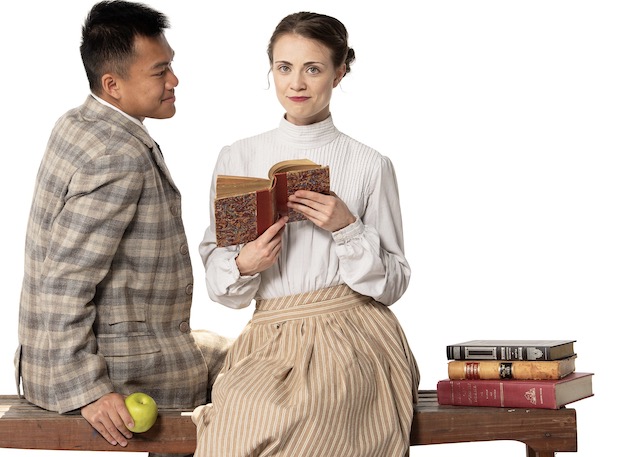
Kevin Nguyen and Zoë Autumn in Blue Stockings (Photo by Emily Cooper)
I wish there was a time store where I could go and demand a refund.
The subject matter of Jessica Swale’s 2013 script is potentially fascinating. Set in 1896, Blue Stockings is about women’s struggle to be granted degrees at Cambridge University. The story features four female students, all gifted scientists, who are members of Girton College, the first college at Cambridge to accept female scholars. If the push for accreditation is successful, these four could be the first women to receive formal degree qualification.
But Swale’s script is politically heavy handed, and it doesn’t find its focus until the second act. Including intermission, the evening clocks in at three hours. (When I realized there was going to be a second act, I suppressed a moan.)
Studio 58 is producing Blue Stockings and the play’s multiple characters provides performance opportunities for many of the school’s student actors but, in terms of theatrical and thematic reward, there isn’t a whole lot here for the audience — at least there wasn’t for me.
Narratively, Act 1 is all over the place. The main character, Tess, is a student astronomer who is trying to find her bearings in the struggle between education on one side and romantic love and family on the other. “Blue stockings” is a derogatory term for highly educated women, who were considered at the time to be both unemployable and unmarriageable. So, as Tess ventures cautiously into a romantic relationship, she and her group are also on the receiving end of considerable misogyny. Tess is exposed to a couple of progressive teachers, and to the cautious and less cautious feminist strategies of two female mentors. For good measure, Tess engages in debates about the relative worth of art and science. And there’s a sudden crisis in the life of an underdeveloped character named Maeve, who is part of Tess’s cohort. But, as Tess finds her footing as an undergraduate, her story doesn’t have a middle.
Narratively, Act 2 is clearer because there’s a goal: Cambridge will hold a vote — open to all male faculty and alumni — on granting degrees to women. Tess’s relationship to this struggle is still somewhat oblique — the charge is led by the conservative feminist Mrs. Welsh, the first Mistress of Girton College — but, driven by her increasingly focused desire to receive a degree and encouraged by the apparent support of her beau, Tess becomes more politically engaged; at long last, her story acquires significant stakes.
But the evening never fully recovers from the pedantic hole that Swale’s script has dug for itself in Act 1. In a very early scene, a visiting psychiatrist named Dr. Maudsley delivers a lecture titled “Hysteria: the Wandering Womb”, in which he argues that women are constitutionally inferior to men, both intellectually and morally. I have no doubt that these ideas were part of the air that women were forced to breathe. But, as the play progressed, I longed for this content to be developed instead of simply repeated. (In this review, I am not objecting to the play’s feminism; I am objecting to the rudimentary nature of its analysis.) Tess engages in not one but three debates about the relative merits of art and science. Conversation after conversation, the script’s exchanges are dully didactic and, in this production at least, the attempts at adding enlivening humour fall flat. The almost slapstick comedy, which appears even in the romantic scenes between Tess and her love interest Ralph, simply underlines the play’s lack of substantial thought.
That said — and I know it’s been a mouthful — under Jamie King’s direction, there’s some fine work from the student actors. Ben Brown is charismatically present as the sympathetic tutor Mr. Banks. Shaye Steele endows Miss Blake, a philosophy tutor, with engaging interiority. Without a huge amount of text to work with, Khalila Ball pulls the emotional rabbit out of the hat as Maeve and Kevin Nguyen also delivers a subtle portrait as Tess’s friend Will. Without laying it on too thickly, Adam Weaver is effectively insinuating as the villainous misogynist Lloyd. Zoë Autumn (Tess) capably carries the heart of the show and, on opening night, understudy Rhys Davies was credibly innocent as Ralph, which is no mean feat.
Emphasizing the ongoing relevance of the feminist content, sound designer Evan Rein anachronistically and effectively mixes traditional choral singing with cacophonous modern music and contemporary pop.
Costume designer Alaia Hamer has clothed the huge cast in impressively well-tailored period costumes, including a lot of hard-to-cut men’s suit jackets.
Wisely — you might say inevitably — director King has leaned into the swaggering, almost agitprop nature of the script. Although the physical comedy hardly ever works for me, King’s energetic choreographic approach to the staging does.
Still, I wish all these artists had been working to illuminate a more substantial script.
BLUE STOCKINGS By Jessica Swale. Directed by Jamie King. A Studio 58 production at Performance Works on Friday, October 8. Running until October 16. Tickets
NEVER MISS A REVIEW: Sign up for FRESH SHEET, my weekly e-letter about the arts.
And, if you want to help to keep independent arts criticism alive in Vancouver, check out my Patreon page.





0 Comments